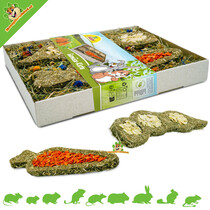Hay for Degus
Meet the Timothee hay rolls for rodents and rabbits, they are not only tasty, but also nutritious and available in several delicious flavours! Both rodents and rabbits will enjoy it to their heart's content. The hay rolls can be given as a variation of th
Read moreGet ready for vegetable fun in XXL format with the JR Farm Veggie Vegetable Box for Rodents & Rabbits! Get ready for vegetable fun in XXL format with the JR Farm Veggie Vegetable Box for Rodents & Rabbits! This box isn't just any vegetable, it's vegetable
Read moreOrder hay for your Degus quickly and easily at DRD Rodent Shop ® The online Degu Webshop!
For hay for your Degus, you have come to the right place in our Degus webshop! Hay is very important for Degus. This is because Degus have a so-called 'full stomach'. Their stomach is not very muscular and therefore cannot independently transport the food pulp to the next part of the intestine. This is supposedly taken over by the following food portions. This also explains why Degus eat many small portions of food per day on average. Their diet consists mainly of fibers!
The large appendix of Degus is the so-called fermentation chamber. This is where the fine dietary fibres of the hay go. There they are converted into proteins, vitamin B and vitamin K by special bacteria.
Degus have a pronounced need to gnaw. That is why they mainly need a structure and fiber rich hay. The hay is not only used as food, but also to meet the gnawing need. A high-quality hay can be recognized by a number of points.
- Smell . Hay should smell fresh. If the hay smells dusty and musty it may contain mold. This is not healthy for either the animal or the owner.
- Feeling . The hay should consist of long, crisp blades.
- Avoiding poisonous plants . A responsible hay producer knows his land and what to look for. Regular inspection for poisonous plants is necessary.
- Untreated natural areas . A high diversity of herbs in the hay is very healthy. It is also important that nature is protected.



